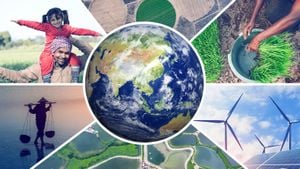Baku, Azerbaijan serves as the backdrop for the 29th Conference of the Parties, more commonly known as COP29, which has kicked off with aspirations for breakthroughs on climate finance. The summit runs from November 11 to 22, 2024, and has already revealed stark challenges as developed and developing countries face off over financial responsibilities and climate action. With over 72,000 delegates from 190 nations convening, the stakes couldn't be higher—yet tangible outcomes remain elusive.
The conference is being dubbed the "Finance COP," tasked with addressing the significant funding gap hindering climate action worldwide. Central to these discussions is the New Collective Quantified Goal (NCQG), which seeks to replace the now-expired $100 billion annual climate finance pledge originally established during the Copenhagen Accord. Unfortunately, the ambitious goal has yet to be met, leading many nations to express their increasing frustrations.
Among those expressing urgency is Teresa Anderson, Global Climate Justice Lead at ActionAid. Speaking from the summit, she highlighted the inequities faced by developing nations: "If we are serious about climate action, we have to pay for climate action." She criticized the insufficient financial aid these nations received, which amounted to only $28-$35 billion last year—significantly less than the financial commitments they require to adequately address climate impacts.
Nations like Bhutan, which is considered one of the most climate-vulnerable countries, have submitted their own requests for assistance. Bhutan's Nationally Determined Contribution (NDC) report indicates the need for $385 million for adaptation and $600 million for mitigation efforts. Yet, accessing international climate funds continues to be met with bureaucratic hurdles, compounded by the demand for grant-based financing for adaptation instead of loans.
At the summit, the discourse around the NCQG has been fraught with tension, hinting at deep divisions. There has been debate over whether the goal should exist as a singular entity or if it should adopt multiple layers to include varied funding sources. Key figures at the conference warn of the consequences of not overcoming these political challenges, with Dr. Pema Gyamtsho from the International Centre for Integrated Mountain Development stating, “We really hope there will be agreements not only on increasing finance for climate action but also enabling access to these finances.”
This negotiation deadlock reflects broader issues with financial mechanisms aimed at facilitating climate action. Critics point out the stark contrasts between promises made and actual commitments realized. So far, agreements like carbon trading under Article 6 of the Paris Agreement have emerged without the clarity needed for effective implementation. Article 6.4's adoption aims to open up international carbon markets, creating avenues for emissions trading—yet the specifics remain ambiguously defined.
Meanwhile, India is establishing its own demands at COP29. Indian negotiator Naresh Pal Gangwar revealed India's aim to secure $600 billion out of the proposed $1.3 trillion climate finance needed annually for all developing nations every year until 2030. He stated, “This (paying the amount) is the responsibility of developed countries...but all funds should come through them only.” The push for loss and damage funds is similarly pressing, as India and other nations are grappling with the devastating impacts of extreme weather events exacerbated by human-induced climate change.
On the other hand, the plight of Small Island Developing States (SIDS) has also dominated discussions. Samoa’s Minister of Natural Resources and Environment, Toeolesulusulu Cedric Schuster, brought attention to the unique challenges faced by these nations at risk of disappearing due to climate change. He stressed the necessity for the NCQG to incorporate specific financial allocations to cater directly to the needs of SIDS, thereby ensuring their survival amid rising sea levels and increasing climatic variability.
Despite the back-and-forth over numbers and promises, some progress has been noted. A breakthrough on carbon markets signaled optimism about bridging the climate financing deficit impacting developing countries. Initiatives like the Global Energy Storage and Grids Pledge aim to bolster renewable energy, with Norway’s commitment of $100 million to India’s energy infrastructure being one of the fresh developments.
The conference has also illuminated the conflicts between climate aspirations and geopolitical realities. Many of the participating countries, including major players like China and the U.S., have opted to keep low profiles, raising concerns about their commitment to climate action. This absence of leadership stands against calls for decisive action.
Experts now urge the need for means beyond simply announcing the goals. They demand credible mechanisms and governance frameworks to facilitate the disbursement of climate finance. Urging for more than mere acknowledgments, leaders are calling for predictable and accessible financing solutions for their nations.
At the end of the day, COP29 lays bare the financial chasm needing to be bridged if global climate goals are to be met. The outcomes of the conference will be pivotal as negotiations enter their second and final week. Early indicators suggest the potential for meaningful agreements may hinge on whether nations can come together to craft feasible solutions—not just for their own populaces but for vulnerable communities around the globe.
Moving forward, the expectation is clear: countries must shake off the shackles of bureaucracy and exhibit genuine political will. Only then can we collectively tackle the mounting climate crisis before it spirals even farther out of control, with repercussions felt the world over. With COP30 slated to take place in Brazil next year, it will be interesting to see how the discussions in Baku shape the climate agenda for months to come.



